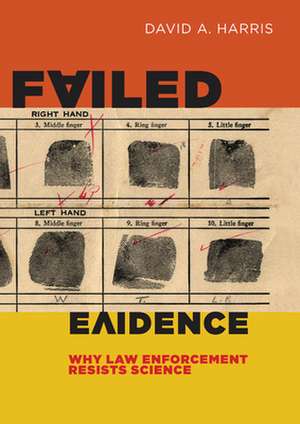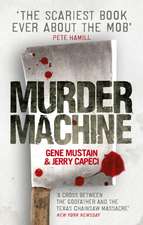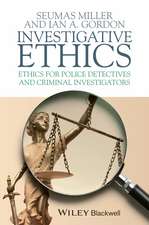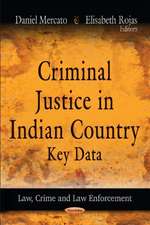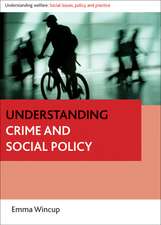Failed Evidence – Why Law Enforcement Resists Science
Autor David A. Harrisen Limba Engleză Hardback – 2 sep 2012
Preț: 280.92 lei
Nou
Puncte Express: 421
Preț estimativ în valută:
53.75€ • 56.01$ • 44.51£
53.75€ • 56.01$ • 44.51£
Carte tipărită la comandă
Livrare economică 03-17 aprilie
Preluare comenzi: 021 569.72.76
Specificații
ISBN-13: 9780814790557
ISBN-10: 0814790550
Pagini: 270
Dimensiuni: 196 x 234 x 23 mm
Greutate: 0.51 kg
Editura: MI – New York University
ISBN-10: 0814790550
Pagini: 270
Dimensiuni: 196 x 234 x 23 mm
Greutate: 0.51 kg
Editura: MI – New York University
Recenzii
"Failed Evidence is a masterful expose of both the flaws in our criminal justice system and the reasons many police and prosecutors are unwilling to correct them. If real change is to occur, would-be reformers need to ingest this book. Its prescriptions, all based on the latest scientific findings, would go a long way toward eliminating wrongful convictions and ensuring accurate verdicts."-Christopher Slobogin, Vanderbilt University Law SchoolWrongful convictions are the worst error the American criminal justice system can make. And yet in the last two decades we have learned both that we regularly convict the innocent and that, as a result of empirical advances in the social sciences, we now know what reforms are necessary to substantially decrease the risk of wrongful conviction. David Harris's well-written and engaging book, Failed Evidence: Why Law Enforcement Resists Science, brilliantly synthesizes this research and its implications, astutely connecting the dots from the reasons why wrongful convictions occur to the solutions necessary to prevent them. If there is one book that I would recommend to policymakers, criminal defense attorneys and prosecutors, police or the members of the general public about the subject of wrongful conviction, it is Failed Evidence: Why Law Enforcement Resists Science.This first rate book is brimming with insight and intelligence. Richard A. Leo, University of San Francisco"David Harris, the nation's leading expert on racial profiling, turns his attention in this timely book to exposing the flaws in three standard investigative techniques used to solve crimes: interrogations, eyewitness identifications, and forensic science. In clear, accessible language, he shows how these flaws can lead juries to convict innocent individuals. He also discusses why those in the best position to address these flaws are likely to resist reform. A must-read for anyone interested in a behind-the-scenes look at the criminal justice system." Cynthia Lee, Charles Kennedy Poe Research Professor of Law, George Washington University
"Failed Evidence is a masterful expose of both the flaws in our criminal justice system and the reasons many police and prosecutors are unwilling to correct them. If real change is to occur, would-be reformers need to ingest this book. Its prescriptions, all based on the latest scientific findings, would go a long way toward eliminating wrongful convictions and ensuring accurate verdicts."-Christopher Slobogin, Vanderbilt University Law School "Wrongful convictions are the worst error the American criminal justice system can make. And yet in the last two decades we have learned both that we regularly convict the innocent and that, as a result of empirical advances in the social sciences, we now know what reforms are necessary to substantially decrease the risk of wrongful conviction. David Harris's well-written and engaging book, Failed Evidence: Why Law Enforcement Resists Science, brilliantly synthesizes this research and its implications, astutely connecting the dots from the reasons why wrongful convictions occur to the solutions necessary to prevent them. If there is one book that I would recommend to policymakers, criminal defense attorneys and prosecutors, police or the members of the general public about the subject of wrongful conviction, it is Failed Evidence: Why Law Enforcement Resists Science.This first rate book is brimming with insight and intelligence." Richard A. Leo, University of San Francisco "David Harris, the nation's leading expert on racial profiling, turns his attention in this timely book to exposing the flaws in three standard investigative techniques used to solve crimes: interrogations, eyewitness identifications, and forensic science. In clear, accessible language, he shows how these flaws can lead juries to convict innocent individuals. He also discusses why those in the best position to address these flaws are likely to resist reform. A must-read for anyone interested in a behind-the-scenes look at the criminal justice system." Cynthia Lee, Charles Kennedy Poe Research Professor of Law, George Washington University
"Failed Evidence is a masterful expose of both the flaws in our criminal justice system and the reasons many police and prosecutors are unwilling to correct them. If real change is to occur, would-be reformers need to ingest this book. Its prescriptions, all based on the latest scientific findings, would go a long way toward eliminating wrongful convictions and ensuring accurate verdicts."-Christopher Slobogin, Vanderbilt University Law School "Wrongful convictions are the worst error the American criminal justice system can make. And yet in the last two decades we have learned both that we regularly convict the innocent and that, as a result of empirical advances in the social sciences, we now know what reforms are necessary to substantially decrease the risk of wrongful conviction. David Harris's well-written and engaging book, Failed Evidence: Why Law Enforcement Resists Science, brilliantly synthesizes this research and its implications, astutely connecting the dots from the reasons why wrongful convictions occur to the solutions necessary to prevent them. If there is one book that I would recommend to policymakers, criminal defense attorneys and prosecutors, police or the members of the general public about the subject of wrongful conviction, it is Failed Evidence: Why Law Enforcement Resists Science.This first rate book is brimming with insight and intelligence." Richard A. Leo, University of San Francisco "David Harris, the nation's leading expert on racial profiling, turns his attention in this timely book to exposing the flaws in three standard investigative techniques used to solve crimes: interrogations, eyewitness identifications, and forensic science. In clear, accessible language, he shows how these flaws can lead juries to convict innocent individuals. He also discusses why those in the best position to address these flaws are likely to resist reform. A must-read for anyone interested in a behind-the-scenes look at the criminal justice system." Cynthia Lee, Charles Kennedy Poe Research Professor of Law, George Washington University
Notă biografică
Descriere
Seeks to explain why law enforcement resists science
